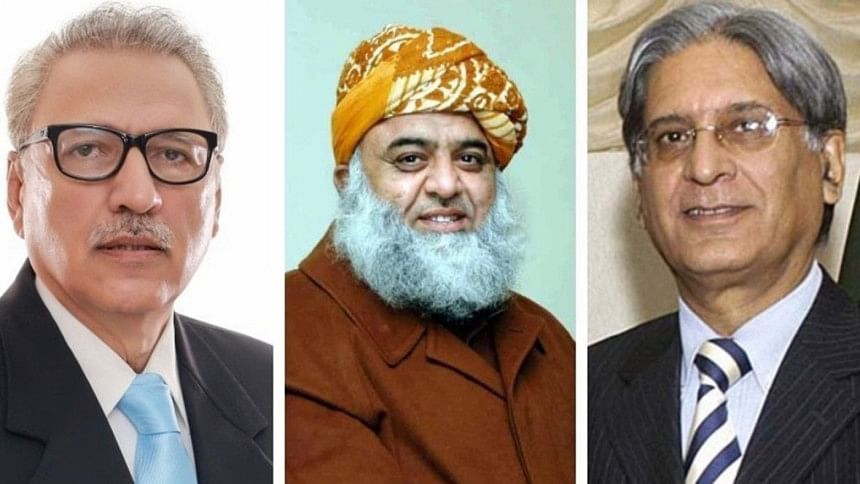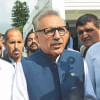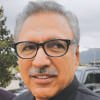Who will be the next president of Pakistan?

Polling is taking place at the National Assembly and four provincial legislatures to elect the 13th president of Pakistan.
The successor to President Mamnoon Hussain will be elected by an electoral college comprising as many as 1,121 members of the National Assembly, Senate and the provincial assemblies of Punjab, Sindh, Khyber Pakhtunkhwa and Balochistan.
Three seasoned politicians are in the race for the office of the head of the state: Dr Arif Alvi of the ruling Pakistan Tehreek-i-Insaf (PTI); PML-N backed chief of the Muttahida Majlis-e-Amal (MMA), Fazlur Rehman; and senior PPP leader Aitzaz Ahsan.
Arif Alvi
Dr Arif Alvi is the nominee of the ruling coalition led by PTI for the presidential post.
Alvi's career in politics spans over five decades and began with his role in student politics as a president of the student union at de'Montmorency College of Dentistry in Lahore.
He was part of the student movement of 1969 during Gen Ayub Khan's military regime and, as his party men say, was among those who fought for democracy in the country.
During one of the protests on The Mall in Lahore, according to PTI activists, he was shot and wounded and "still 'proudly' carries a bullet embedded in his right arm as a mark of his struggle for democracy in Pakistan".
A dentist by profession, Dr Alvi is among the founding members of the PTI. He had contested for Sindh Assembly seats in the general elections of 1997 and 2002, but remained unsuccessful.
Dr Alvi is regarded as one of the authors of the PTI's constitution. He was part of the PTI's central executive council for a year since 1996 and then he was appointed the party's president in Sindh in 1997.
In 2001, he was promoted to the post of vice president and then became the party's secretary general in 2006, a post he held until 2013.
He won from NA-250 constituency of Karachi in the 2013 elections.
In the July 25, 2018 general elections, he was elected to the National Assembly from Karachi's NA-247 after bagging 91,020 votes. In comparison, his rival, Syed Zaman Ali Jaffrey of the Tehreek-i-Labbaik Pakistan, managed only 24,680 votes.
Fazlur Rehman
Jamiat Ulema-i-Islam (Fazl) chief Maulana Fazlur Rehman emerged as one of the two opposition nominees for the presidential polls after the grand opposition alliance formed after the July 25 general elections crumbled within a month, with its component parties failing to reach a consensus on a joint candidate despite several huddles.
The JUI-F chief, who had been playing the role of a mediator between the PML-N and the PPP, has the backing of all component parties of the now-defunct Pakistan Alliance for Free and Fair Elections (PAFFE), whereas the PPP is now facing isolation.
Besides the Muttahida Majlis-i-Amal and the PML-N, 65-year-old Rehman, who had faced defeat in two constituencies in the July 25 general elections, is also being supported by the Awami National Party, Pakhtunkhwa Milli Awami Party and National Party.
Rehman is one of most complex and exciting figures of Pakistani politics.
He assumed the office of the Secretary General of Jamiat Ulema-i-Islam in 1980, at the mere age of 27, following the death of his father, Maulana Mufti Mahmud.
The young leader was able to outfox all the maulanas of the Deoband school and has been heading JUI-F, the largest faction of the party, without any challenge since the late 1980s.
Since the 1990s, as other major religious parties watched their fortunes dwindle, Fazl was able to weather hostile conditions through unlikely alliances with successive ruling parties, allowing him to sustain patronage networks in his areas of influence.
The Musharraf era saw Fazl at the peak of his power, proven by his status as leader of the opposition between 2004-2008 and the chief minister in the MMA-led KP government being a legislator from his party.
Today, the PTI has emerged as a serious threat to the JUI-F. Imran Khan has been able to lure many young voters out from under JUI-F's influence and into the PTI.
If Fazl loses the presidential election, we will see the maulana out of power after a long time.
Aitzaz Ahsan
Former senator, lawyer and human rights activist Aitzaz Ahsan has been fielded by the PPP for the presidential election. The party stuck with Ahsan's name despite desperate appeals by other opposition parties to convince co-chairman Asif Ali Zardari to withdraw the barrister's name in favour of a joint opposition nominee, Fazlur Rehman.
Born in Murree, British India, Ahsan was first elected to the Punjab Assembly in 1972 from PP-28 Gujrat. He went on to be appointed Punjab information, planning and development minister during the PPP government in the 70s.
He left PPP in 1977 over allegations of rigging in general elections and later joined Tehreek-i-Istaqlal of Asghar Khan.
He remained an active member of the Movement of Restoration of Democracy against Ziaul Haq's martial law, due to which he was jailed multiple times.
Ahsan re-joined PPP in 1988 before the formation of Benazir Bhutto's first government and was elected as an MNA. He served as the law minister and interior minister until 1990.
Ahsan was elected to Senate in 1994, and served as Leader of the House and Leader of the Opposition until his tenure expired in 1999.
In 2002, he contested the election from NA-124 Lahore and NA-187 Bahawalpur constituencies and succeeded in both contests. He later retained the Lahore seat.
Ahsan was actively involved in the 2007 lawyers' movement and supported former chief justice Iftikhar Chaudhry.
His membership of PPP's central executive committee was cancelled in 2009 over charges of criticising party leadership and taking part in rallies and holding marches in violation of the party's policy.
He was elected to the Senate on a technocrat seat representing PPP in 2012. He served as Leader of the Opposition until his tenure expired in March 2018.
Ahsan is a senior Supreme Court advocate and has legally defended three prime ministers of Pakistan.
Copyright: Dawn/ Asia News Network

 For all latest news, follow The Daily Star's Google News channel.
For all latest news, follow The Daily Star's Google News channel. 





Comments